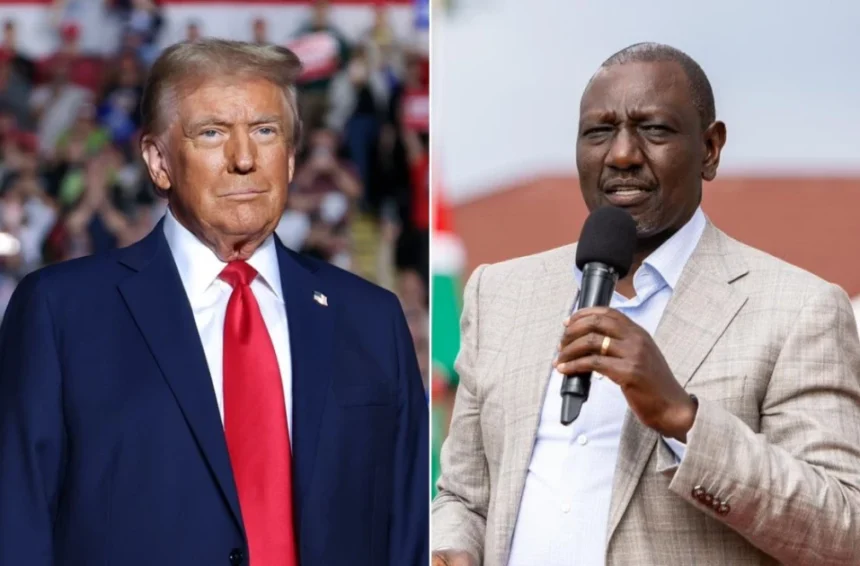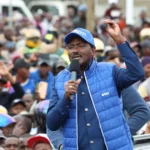President William Ruto is scheduled to tour the United States next month for the 80th session of the United Nations General Assembly (UNGA) in New York, marking his first trip to the U.S. under President Donald Trump’s administration.
The high-level meeting is expected to be a critical test of Kenya’s diplomatic influence in Washington.
Trump has often faced criticism for his cold and transactional approach to hosting African leaders at the White House, a sharp contrast to the warm diplomatic traditions of previous U.S. administrations.
His meetings have frequently been described as highly choreographed and stripped of the grandeur associated with state visits, creating an image of tense engagements rather than genuine diplomacy.
Last month, Trump hosted a mini-summit for leaders from Gabon, Guinea-Bissau, Liberia, Mauritania, and Senegal, which observers widely characterized as a carefully staged event aimed at projecting Trump as the “puppet master.”
This precedent fueled speculation over whether President Ruto will receive a similarly frosty reception when he visits the United States in September.
The UNGA session is scheduled from September 9 to 29, with the high-level General Debate running from September 23 to 27.
For Ruto, the visit carries high stakes as Kenya faces a proposed review of its designation as a Major Non-NATO Ally of the United States.
According to U.S. Senator James Risch, the review will examine Kenya’s foreign and diplomatic alignment, particularly its engagements with China, Russia, and Iran.
It will also assess Kenya’s political or financial ties to armed militias such as al-Shabaab and the Rapid Support Forces (RSF), as well as potential misuse of U.S. security and intelligence support for human rights violations, including abductions, torture, and violence against civilians.
Ruto has previously defended his strong ties with China, arguing that the relationship benefits Kenyan exports.
On August 6, 2025, he praised Beijing for lifting tariffs on key agricultural products, including tea, coffee, and avocados.
“It’s partly why I have a bit of a problem with some of our friends. But it is what I must do for Kenya… It’s in the best interest of Kenya that we get into this market,” Ruto said at the time.
Other issues likely to feature in discussions include the Multinational Security Support (MSS) mission in Haiti, led by Kenyan forces.
Following his return to office, President Trump imposed a 90-day pause on foreign aid, threatening funding for numerous projects across Africa.
However, a subsequent conversation between Ruto and U.S. Secretary of State Marco Rubio confirmed that the MSS mission had been exempted, signaling Washington’s support for Kenya’s peacekeeping role in Haiti.
Another critical agenda item will be trade. Kenya is seeking to secure a free-trade agreement with the United States as the African Growth and Opportunity Act (AGOA) approaches its expiry this September.
Since its inception in 2000, AGOA has allowed Kenya to export goods duty-free to the U.S. However, Trump’s sweeping tariff policies on global trade partners could impact Kenya’s exports, which were valued at $737.3 million (approximately Ksh.95.3 billion) in 2024; largely apparel, coffee, and tea, according to the U.S. Trade Representative.
While courting new markets to reduce dependency on Washington, Ruto is also positioning himself to align with Trump’s stated policy shift from “aid to trade,” which the U.S. president argues is more sustainable and mutually beneficial.
Beyond trade and security, Ruto is expected to pitch for Nairobi to host the first-ever African edition of the Grammy Awards, a move he says will establish Kenya as a continental creative hub.
His administration is currently in talks with the Recording Academy to facilitate the event and develop world-class recording infrastructure.
Whether Ruto can strike meaningful bilateral deals, secure continued U.S. support for security operations, and advance his cultural diplomacy agenda or face a tense, transactional reception like other African leaders, remains to be seen.
The upcoming U.S. tour could prove to be a defining moment for Ruto’s presidency, shaping Kenya’s economic and diplomatic future on the global stage.



